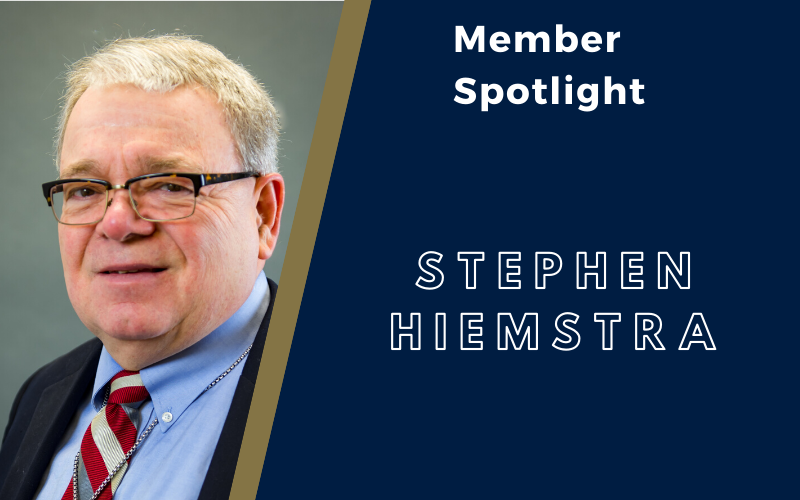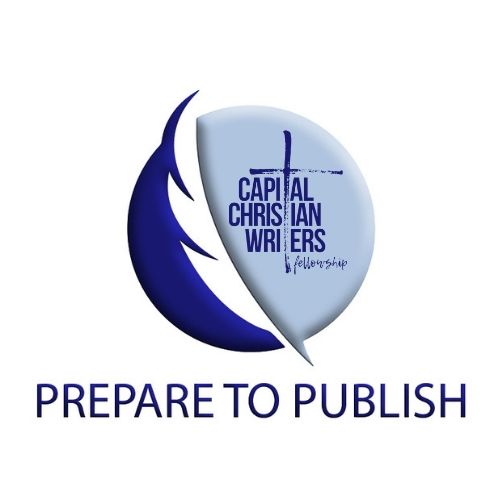Member Spotlight: Stephen W. Hiemstra
What type of writing do you do? And are you traditionally published or self/indie published?
Stephen: I have published Christian nonfiction in English and Spanish focused on Christian spirituality since writing my first draft in 2013. After joining the antecedent to CCWF, I began blogging in September 2013 posting four to five times weekly with a theme of online pastor. A typical week begins with a prayer followed by a podcast, book review, commentary, and reflection from my most recent writing project.
In April 2020, I published the fifth book in my Christian spirituality series, Living in Christ, My current project is translating my second book in the series, Life in Tension, into Spanish. Later in the year I hope to focus my attention on my first novel, a romantic suspense, tentatively entitled: Tension.
My books have been published by T2Pneuma Publishers LLC, my own publishing company, because my platform appears too small to attract a traditional publisher able to offer substantive assistance with editing and marketing. My first book, A Christian Guide to Spirituality, attracted a publishing contract in 2013, but the publisher offered neither editing or marketing support sufficient to make the contract interesting and we broke off further negotiations.
What inspired you to begin writing?
Stephen: I published numerous government studies, book reviews, and articles throughout my career as an economist, as is obvious when you search on my name in WorldCat.org. Judged by the number of libraries hosting copies, my most popular publication is no doubt a government study. For kicks and giggles, I used to review technical books published in Spanish and German, which the economics journals really ate up. The reviews were fun to write because most technical studies offer much less room for personal expression.
After retiring from federal service in 2010 and graduating from seminary in 2013, I wrote my first book out of frustration with the weak understanding that many Christians have of their own spirituality. New Age thinking pervades church thinking even in evangelical circles because of a lack of interest in theology and an emphasis on the emotional side of faith. A Christian Guide to Spirituality, which I later translated into Spanish,focuses on understanding Christian fundamentals, like the Ten Commandments, the Lord’s Prayer, and the Apostle’s Creed. I was able to draft the book as a devotional with prayers and discussion questions in an intense six weeks of writing, because I was able to adapt reflections from newsletter articles that I had written in seminary.
Do you schedule the time or write when the Spirit moves you?
Stephen: I schedule my writing by the needs of my blog, T2Pneuma.net. Because each post is different during the week, my interest seldom flags, although I do burn myself out occasionally when I blog ahead to make time for editing or translating.
The corona virus pandemic has simplified my life by making it imprudent to volunteer my time and visit my parents as had been my custom up until March. I feel guilty for not being available to do these things, but it has allowed me to focus more time and energy on my writing.
What are your favorite resources for writers and why?
Stephen: CCWF has played a key role in my writing journey. I started blogging in 2013 because of a CCWF presentation and members have provided me both inspiration and technical knowledge that is not easily discovered other ways. The emotional support provided is also important if you are going to be a writer over the long haul.
Another important tip that I share with authors starting out is to look up a writing platform called: Scrivener (https://www.LiteratureAndLatte.com). I started using Scrivener because it was an easy way to create the primary EBook formats, Kindle and EPub. However, I have come to appreciate the flexibility of the editor for creating first drafts, even if I publish my print editions in Adobe InDesign, where a fixed format is needed.
When do you bring in outside help? Beta readers or street team? Editors? Book/cover designers? Marketing help?
Stephen: I am pretty much a jack of all trades. I write my books, design the interiors, and create my own covers. I also write my own ad copy, write my monthly email newsletter, and manage my websites. I cannot reliably edit my own work beyond a certain point and started employing web designers a couple years back. Other contributors playing a key role are those willing to write my blurbs and forewords.
Recruiting good people to write endorsements and forewords is probably the most emotionally challenging aspect of being an author and publisher. The best contributors are well-known authors who have little time to read other people’s work. I have come to think of this as a networking activity where I have a golden opportunity to interact with these people and create a bit of buzz in circles where readers are less likely to be found.
What is your writing dream?
Stephen: Writing is my ministry. I cannot reach people until they buy my books and take time to read. This is why I blog. My current translation work with Vida en Tensión arose when in my annual review of posts in 2019 I found that my number one post in 2019 was a Spanish bible study and four of the top ten posts for the year were Spanish bible studies that I had written years ago. So I began translating my second book and looked for ways to better market my first Spanish book: Una Guía Cristiana a la Espiritualidad. I was shocked and very pleased to see that for the first time ever this book topped my sales chart last week.
What would you most like to share with other Christian writers?
Stephen: The current pandemic has kept people at home and many have begun reading for the first time in years. Over the past four weeks, my books sales have about doubled. My prayer is that in their loneliness and pain in this crisis people will grow closer to their families and turn to God. For the people of planet earth, this is a Gethsemane moment (Matt 26:36-39).
This is clearly a Gethsemane moment, when we have the choice between turning into our pain or turning to God. But, what does turning to God look like? In a similar crisis—the U.S. Civil War—President Lincoln declared a National Day of Prayer—Thanksgiving. This is an important precedent for the current crisis because in turning to God we admit our inadequacy and turn away from various traps, like political division. Being open to God’s will for our lives is an obvious plea for wisdom, which we sorely lack.
For Christian writer, now is a good time to remind people of God’s presence and love. I have tried to do since March 25th with a new weekly post: Water Cooler Observations, May 13, 2020, where I offer a Christian perspective on the current pandemic.

Stephen W. Hiemstra (MDiv, PhD) is a slave of Christ, husband, father, author, and volunteer pastor in Hispanic ministry. He lives with his wife, Maryam, of over thirty years in Centreville, Virginia and they have three grown children. Stephen writes on Christian spirituality in English and Spanish. He published his most recent book, Living in Christ, in April 2020. He blogs five times weekly at T2Pneuma.net, including a podcast on Mondays. Before graduating from seminary in 2013, Stephen served for twenty-seven years in five different agencies as a federal economist.
http://www.T2Pneuma.net (blog)
http://StephenWHiemstra.net (Author site)
http://www.T2Pneuma.com (Publisher’s site)





